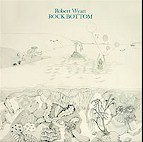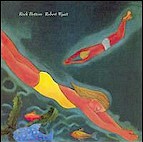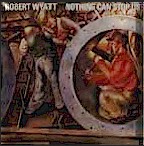
Genre: progressive
Rating: *** (3 stars)
Title: Rock Bottom
Company: Virgin
Catalog: VR 13-112
Year: 1974
Country/State: Bristol, UK
Grade (cover/record): VG / VG
Comments: still in shrink wrap
Available: 1
GEMM catalog ID: 5374
Price: $50.00
Former Wilde Flowers, Soft Machine and Matching Mole front man Robert Wyatt's a mystery to most Americans (including myself). Critics seem to go ga-ga over him, but to my ears his fragile tenor voice and political baggage are at best an acquired taste. Still, I'm always curious and some of the material I've been exposed to is fascinating.
After two studio albums and a solo effort "End of an Ear" Wyatt broke Matching Mole up in late 1972, heading off to Italy with then-girlfriend/poet Alfreda Benge. Returning reinvigorated to the UK he decided to reactivate Matching Mole. Unfortunately while attending a party hosted by Gong's Gilli Smyth, in July 1973 a drunk Wyatt fell out of a fourth floor window. He shattered his spine and was left paralyzed from the waist down. During a difficult recuperation period and extensive physical therapy Wyatt continued to write material. Within a matter of months of his release from the hospital the now wheelchair confined Wyatt resumed his career as a solo act.

young and not-so-young Robert Wyatt
Produced by Pink Floyd's Nick Mason (the Floyd had sponsored and performed at a benefit concert to raise money for Wyatt's medical bills), 1974's "Rock Bottom" marked Wyatt's second solo LP and his first post-Matching Mole solo effort. Released on Richard Branson's newly formed Virgin Records the album found Wyatt working with an impressive cast of friends including Gong drummer Laurie Allan, future wife Benge (she also designed the cover), poet Ivor Cutler, Henry Cow guitarist Fred Firth, and Mike Oldfield. And now for a word of warning ... Anyone looking for top-40 commerciality should stop right here. Though it generate rave reviews, "Rock Bottom" wasn't even close to being commercial. On the other hand it deserved to be characterized as a 'special' LP that should hold a great deal of appeal for anyone willing to give it a chance. Asides from the music it was amazing that Wyatt could find the energy to record an album in the wake of recent tragedy. Even more stunning was the material itself. Whereas most singer/songwriters go suicidal at the thought of lost love, social awkwardness, or a major personal crises such as a hangnail, Wyatt responded to personal tragedy with a mixture of humor ('Alfie'), optimism and patented social criticism ('Little Red Robin Hood Hit the Road'). Exemplified by material like the leadoff ballad 'Sea Song', a significant portion of the six tracks were arty and experimental showcasing ever shifting melodies, discordant passages, odd time signatures, and Wyatt's obscure lyrics. The funny thing was that individually and collectively the songs somehow hung together, a weird sense of coherence somehow scrabbling out of the aural chaos. I've never been big on flowery descriptions, but the set definitely had a fragile beauty. Perhaps a better comparison, the album's fascinating in the same way it's impossible to take your eyes off of a bad traffic accident.
"Rock Bottom" track listing:
(side 1)
1.) Sea Song (Robert Wyatt) - 6:30
2.) A Last Straw (Robert Wyatt) - 5:44
3.) Little Red Riding Hood Hit the Road (Robert Wyatt) - 7:40
(side 2)
1.) Alfibi (instrumental) (Robert Wyatt) - 6:55
2.) Alfie (Robert Wyatt) - 6:17
3.) Little Red Robin Hood Hit the Road (Robert Wyatt) - 6:19
Thanks to YouTube, there's also a clip of Wyatt performing 'Sea Song' at a 1975 Paris concert:
http://www.youtube.com/watch?v=_9g6La7wmzA
'Sea Song'
The album's been reissued numerous times including a 1998 package by the Thirsty Ear label which sported different cover art:

catalog number THI 57045.2
The Thirsty Ear package included some interesting recollections from Wyatt himself:
"This music began to emerge in Venice, during the winter of 1972, on the tiny island of Giudecca in a huge old house overlooking the lagoon.
For a couple of months I spent the days alone, while Alfie and a bunch of friends spent their days working on a film. After years of constant work, in groups and on the road, I was uneasy about doing nothing all day. To keep me occupied, Alfie bought me a very basic little keyboard with a particular vibrato, that shimmered like the water that surrounded us. The basic structure of the music was written there, in between watching the lizards on the walls of the house and visiting the local bar to listen to out-of-work gondoliers practicing 'O Sole Mio'.
'Don't Look Now', the film that my friends were working on, centered around a series of unforeseen disasters in the life of a couple. Venice itself featured as a sinister presence in the film. Alfie always remembers Nic Roeg, the director, reiterating the theme of the film; WE ARE NOT PREPARED.
Back in London, during the spring of 1973, I began to organize a new group to perform the material I was preparing. I continued work on the music, and wrote the words for 'Alfie', 'Sea Song', and 'A Last Straw' in Alfie's flat on the 21st floor of a recently built council block in the Harrow Road. This block was demolished a few years ago. It was a health hazard, riddled with flaking asbestos. The space that we had occupied, where we'd got to know each other, is now just part of the sky. We often look back at that air, and imagine our ghostly young selves suspended there, unprepared for what was to come.
On June 1st 1973, the night before the new group was to have its first rehearsal, I fell from a fourth floor window and broke my spine. I was sent to Stoke Mandeville Hospital for eight months, where they saved my life and taught me how to live in a wheelchair.
I spent three months lying flat on my back, gazing at the ceiling of a surreal public dormitory amongst twenty others whose lives had also radically changed in a split of a second; victims of bad driving, industrial accidents, a misjudged somersault on a trampoline, a wrong-footed escape during a burglary. We all had to think about our future.
I came to terms with the fact that I was no longer a drummer, and that going on the road would be very problematic. I no longer needed to prepare music for a permanent group, I'd have to concentrate on recording, and I'd have to sing more. I would be able to choose different musicians for different songs. I didn't need to have the same instruments on every song. The loss of my legs might give me a new kind of freedom. (The cat burglar was considering fraud as a new career).
Between visitors, operations and hospital bustle, I began to think about the music I'd been preparing in a different way. At the end of three months, I was given my wheelchair, and discovered an old piano in the visitors' room. I played truant as often as I could from the activities that newly paralyzed people are given as therapy (archery, and gluing mosaics on bottles to make weird lamps), and escaped to the piano, whenever the room was free, to develop the songs I'd begun with the lizards by the Venice lagoon.
By the time I left the hospital, I was ready to record, but we now had nowhere to live. A kind friend, Delfina, lent us a wheelchair-friendly cottage in Wiltshire. There, at the beginning of 1974, I began to record with Virgin Records' Mobile Studio parked in the adjoining field, while a donkey brayed in the background. In the spring we found a home in London where I prepared for the contributions from the other musicians which were recorded and mixed at the Manor Studio and CBS.
On July 26th, 1974, (the 21st anniversary of the attack on Moncada, which was the first action that led to the Cuban Revolution), Rock Bottom was released, and I married Alfie, and we lived happily ever after."
While the album generated critical acclaim it proved a mediocre seller. Wyatt subsequently continued his collaboration with producer Mason, releasing a single in the form of a cover of The Monkees' 'I'm a Believer' b/w 'Memories of You' (Virgin catalog number VS114). The 45 unexpectedly provided Wyatt with a top-40 UK hit.

YouTube also has a clip of Wyatt performing the song on the BBC's Top of the Pops television series. Interestingly the performance apparently created a major stink with BBC management originally demanding that Wyatt be seated in a regular chair. Their stance was apparently predicated on the belief Wyatt's physical condition would traumatise the viewing audience. Wyatt refused to go along with the demand, insisting that he be shown in his wheelchair. The BBC eventually caved.
http://www.youtube.com/watch?v=L-FmG4JTIfk
"I'm a Believer"
